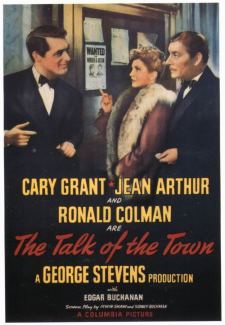
THE TALK OF THE TOWN
US, 1942, 118 minutes, Black and white.
Cary Grant, Jean Arthur, Ronald Colman, Edgar Buchanan, Glenda Farrell, Charles Dingle.
Directed by George Stevens.
The Talk of the Town was nominated for many Oscars in 1942. It is the work of George Stevens who won Oscars for A Place in the Sun and Giant. Stevens directed many classics of the 30s and 40s and directed Cary Grant with Irene Dunne in Penny Serenade at this time.
The film is a Cary Grant vehicle. However, he seems wildly miscast. It is very hard to imagine Cary Grant as a union leader and rabble rouser during a strike in an industrial town in the United States. His suave manner and clipped way of speaking do not give credibility to his role as Leopold Dilg and his activities on behalf of the workers. He hides out in the home of Norah (Jean Arthur) and poses there as a gardener. The other star is Ronald Colman, always a suave presence on-screen, who is a professor of law and has very strong views on how the law should administer justice in the case of Dilg and his activities.
Charles Dingle is the sinister plant owner – something that he did in quite a number of films including The Little Foxes with Bette Davis.
The film is interesting in its picture of industrial affairs in the 1930s and 1940s – and is interesting when seen in the retrospect of the 20th century and industrial relations.
1. A classic film of the 1940s? The work of George Stevens and his polished style? The star quality of the cast? The literate screenplay? Social issues of the time?
2. Columbia production values of the 1940s? Black and white photography, the re-creation of the town life? The musical score?
3. The title, the reference to Dilg, his notoriety, Professor Lightcap talking about him? Norah? The people, the factory owners? The police?
4. The authenticity of the town, the factory? Andrew Homes and his power? Issues of money and corruption? Law? The manipulation of law? The lynch mob attitudes? The role of the media?
5. Cary Grant as Leopold Dilg? Credible in the role? His work in the town, the unions, industrial unrest? The burning of the factory? The accusations against him? His being able to escape? His hiding with Norah? The comic touches, screwball type, of his disguise and hiding out with her? The dogs? Professor Lightcap and the interactions? His posing as Joseph the gardener? The discussion about law and its administration? The interpretation of law? The difference between a head approach and a heart approach? His friends, the cover? The relationship with Norah, comic and romantic? The truth? His physical violence, the knockout? His escape? Michael and Boston? His return? The arrest, the nature of the trial, the emergence of the truth? The national repercussions of the case? And a happy ending for Leopold Dilg?
6. Ronald Colman as Michael Lightcap, appropriate as the law professor? His knowledge of the law, his reputation, a judge? His arrival for his vacation, the comic touches? Norah and her hospitality? His being gracious? His theories, the discussion about law, the Dilg issue? Principles and a philosophical approach? The dog and the chase? The town at the baseball – and his role as a judge? Sam Yates, the interactions? Interactions with Andrew Holmes? His anger? The truth? The punch? His attitude towards Norah, his changing his attitude towards Dilg? Lying? Going to Boston? The drive and the police? The dance – and his beard? In court, the senator and the other dignitaries present? His role and action as the judge?
7. Norah as a romantic heroine, screwball comedienne, Jean Arthur’s style and popularity at the time? Nice, her mother, her friendship with Leopold, letting him hide out, the comic touches and the timing, concealing his identity, her anxieties – especially in the discussion between Michael and Leopold? Her excusing him that he was the gardener? Her bonds with Sam? Her place in the town? Boston and the ending?
8. The portrait of homes, money, corruption? Presumptions and arrogance? The judge? The girl and her friend? In Boston and the repercussions?
9. Sam, genial, older, his advice, his help?
10. The senators, the court cast, the role of the media, the importance of the law? The significance of Tilney?
11. A literate script, the strength of verbal wit and dialogue? The issues, especially of law and its interpretation? Americana? The significance of the final speech?
12. The blend of the serious with farcical touches and romance?